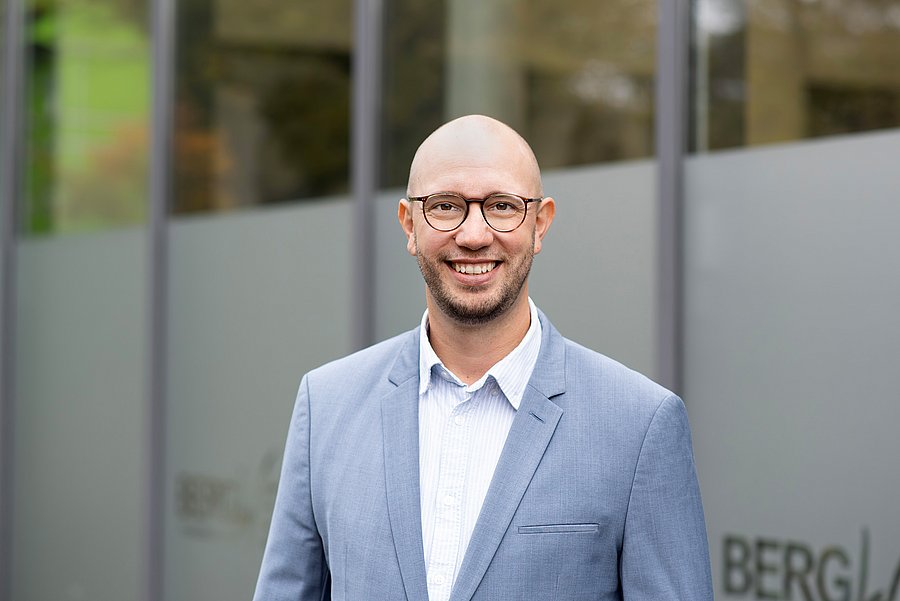Personnel
More than exercise: How university sports centres can shape university life

The new head of the university sports centre since October: Dennis Fink // Photo Friederike von Heyden
What made you decide to come to the University of Wuppertal?
The university sports centre offers a unique opportunity to connect and encourage both students and staff through sport. This role combines my passion for sport with working in a dynamic, academic environment. After my previous professional stations, which were strongly focused on youth development and prevention, I see university sports centres as an opportunity to build on an already very good foundation and to shape sport as an innovative part of university life. The broad spectrum of people who can be reached through university sports centres is particularly appealing to me - whether it's to promote health or to strengthen social cohesion on campus through sport.
In my discussions with Rector Prof Dr Birgitta Wolff and Chancellor Dr Ursula Löffler, it quickly became clear that the university is pursuing a sustainable and far-sighted strategy. The aim is not only to attract students to BUW, but also to accompany them throughout their studies and support them on their way to a successful degree. From the point of view of those responsible, sport plays a central role in this. This supportive and future-orientated approach convinced me to move to the University of Wuppertal.
What challenges do you see for university sports centres in the future?
One of the central challenges for the university sports centre at the University of Wuppertal is to expand the range of activities on offer for students and staff. In order to meet the different interests and needs of the university community, it will be important to make optimum use of the available space resources and to examine ways in which we can develop additional sports areas. This is the only way we can ensure that we offer a diverse and attractive sports programme for everyone.
Tell us a few of your ideas!
Digitalisation is also playing an increasingly important role in sport. New digital concepts and tools need to be integrated into university sports centres, whether in terms of organisation, communication or the use of apps and online platforms for training and courses. I see great potential here to make the programmes even more flexible and accessible for participants. One initial approach will be the implementation of a digital tool that works in a similar way to the Wahl-O-Mat and uses a series of specific questions to suggest a university sports centre offer to users, taking into account their individual inclinations and needs.
Another important point is the promotion of commitment, especially in the area of trainers. It will be crucial to motivate people to get involved as coaches and supervisors in the long term.
We also need to drive forward the continuous development of cross-cutting tasks such as integration, inclusion and the prevention of sexualised violence. University sports centres can be an important place for communicating values, where fairness, respect and team spirit are actively practised. All of these aspects together are central to making university sports centres fit for the future.
What are you looking forward to?
It is particularly exciting that the World University Games will be held in Germany next year, in the Rhine/Ruhr region. This international event offers a unique opportunity to actively involve Wuppertal's university sports centre. We will be supporting the games in a variety of ways and are currently considering how we can enable BUW students and staff to take part in this major event. This not only creates a special closeness to a major sporting event, but also strengthens the sense of community within the university.
What role does sport play for students and employees? And what contribution can university sports centres make?
Sport plays a central role for students and employees in balancing out the often stressful everyday life. For students, university sports centres offer the opportunity to find a physical balance and at the same time make social contacts that go beyond their studies. Regular sporting activity not only promotes health, but also improves concentration and helps to reduce stress - all factors that have a positive effect on academic success.
Sport is also a valuable resource for university employees to stay fit and healthy, especially in jobs that require a lot of sedentary work. University sports centres also provide a platform to promote interaction between students and staff, which strengthens the sense of community and builds a bridge between the different groups within the university.
University sports centres can therefore do much more than just offer sports activities. It can play a key role in promoting health, team building and creating a positive social environment at the university.
About the person
Dennis Fink holds a degree in sports science and studied at the German Sport University Cologne, specialising in rehabilitation and prevention. He then worked as a research assistant at the German Sport University, which gave him the opportunity to gain valuable insights into academic and sport science work. In 2016, he moved to the DJK-Sportjugend - the youth organisation of the Catholic sports association - as managing education officer. In recent years, he was part of the management team at Jugendzentren Köln gGmbH, where he was responsible for child and youth welfare as head of department.
His sporting interests today lie in endurance sports: running and cycling. "I particularly enjoy outdoor sports, as I find the combination of exercise and nature very enriching. The Bergisches Land region offers excellent opportunities for this, which I like to use to stay active and explore new routes," says Dennis Fink.
